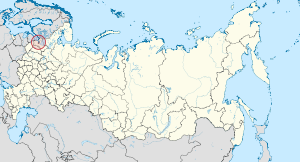Saint Petersburg - Simple English Wikipedia, the free encyclopedia
| Saint Petersburg Санкт-Петербург (Russian) | |||
|---|---|---|---|
| — Federal city — | |||
 Clockwise from top left: Peter and Paul Fortress on Zayachy Island, Smolny Cathedral, Bronze Horseman on Senate Square, the Winter Palace, Trinity Cathedral, and the Moyka river with the General Staff Building. | |||
| |||
Coordinates: 59°56′15″N 30°18′31″E / 59.93750°N 30.30861°E | |||
| Political status | |||
| Country | Russia | ||
| Federal district | Northwestern[1] | ||
| Economic region | Northwestern[2] | ||
| Established | 27 May 1703[3] | ||
| Federal city Day | 27 May[4] | ||
| Government (as of October 2018) | |||
| • Governor | Alexander Beglov (UR, acting)[5] | ||
| • Legislature | Legislative Assembly | ||
| Statistics | |||
| Area [6] | |||
| • Total | 1,439 km2 (556 sq mi) | ||
| Area rank | 82nd | ||
| Time zone(s) | MSK (UTC+04:00) | ||
| ISO 3166-2 | RU-SPE | ||
| License plates | 78, 98, 178, 198 | ||
| Official languages | Russian[7] | ||
| Official website | |||
Saint Petersburg (Russian: Санкт-Петербу́рг, romanized: Sankt-Peterburg) is a Russian city in northwestern Russia, near the Gulf of Finland of the Baltic Sea. Over five million people live in St. Petersburg as of 2015, and it is the second biggest city in Russia. It is a major port, connecting with the world's shipping paths through the Neva River and the Baltic.
Part of Saint Petersburg is designated a World Heritage Site called The Historic Centre of Saint Petersburg and Related Groups of Monuments.
History
[change | change source]Saint Petersburg was started by the Russian Tsar, Peter I as the capital of the Russian Empire in 1703, to take the place of the earlier capital, Moscow. It was the capital of Russia until 1918. Peter the Great established Saint Petersburg as a warm-weather port in order to show Russian dominance in the Baltic and to increase trading opportunities. Peter sought to modernize Russia, therefore he tried to make Saint Petersburg as different as possible from the former capital, Moscow, by modernizing the city.
Saint Petersburg has changed its name many times. During World War I, when Russia and Germany were fighting each other, Russians thought the name Sankt Peterburg sounded too German, so Tsar Nicholas II, on August 31 (August 18, Old Style), 1914 decided that the city was renamed Petrograd. In 1918 during the Russian revolution, the Soviet capital was moved to Moscow, still the capital of Russia now.
On January 26, 1924, five days after Lenin's death, Petrograd was renamed Leningrad in his honor. During World War II, the city was surrounded by the German army and under siege for twenty-nine months until January 1944.
Leningrad again took its old name of St. Petersburg on September 6, 1991, when Russia stopped being communist. In every-day Russian, the city is often called just "Piter". The Oblast (administrative province) where the city is the capital is still called "Leningrad Oblast".
Saint Petersburg was a beautiful city planned by Peter I. There are many man-made rivers (or canals) in the city, so the city is sometimes called the Venice of the North. There are also beautiful buildings built by Russian emperors in other places of the city. Some of these buildings are the Hermitage Museum and the Winter Palace.


Geography
[change | change source]Saint Petersburg is located in Northwestern Federal district of Russia. The area of the city is 605.8 km². Saint Petersburg has an area called Leningrad oblast. The city has also many islands such as Vasilyevsky Island, Kotlin Island, Kamerny Island, Aptekarsky Island etc.
The climate is a humid continental.
References
[change | change source]- ↑ Президент Российской Федерации. Указ №849 от 13 мая 2000 г. «О полномочном представителе Президента Российской Федерации в федеральном округе». Вступил в силу 13 мая 2000 г. Опубликован: "Собрание законодательства РФ", №20, ст. 2112, 15 мая 2000 г. (President of the Russian Federation. Decree #849 of May 13, 2000 On the Plenipotentiary Representative of the President of the Russian Federation in a Federal District. Effective as of May 13, 2000.).
- ↑ Госстандарт Российской Федерации. №ОК 024-95 27 декабря 1995 г. «Общероссийский классификатор экономических регионов. 2. Экономические районы», в ред. Изменения №5/2001 ОКЭР. (Gosstandart of the Russian Federation. #OK 024-95 December 27, 1995 Russian Classification of Economic Regions. 2. Economic Regions, as amended by the Amendment #5/2001 OKER. ).
- ↑ Official website of St. Petersburg. St. Petersburg in Figures Archived 19 February 2009 at the Wayback Machine
- ↑ Законодательное Собрание Санкт-Петербурга. Закон №555-75 от 26 октября 2005 г. «О праздниках и памятных датах в Санкт-Петербурге», в ред. Закона №541-112 от 6 ноября 2008 г. (Legislative Assembly of Saint Petersburg. Law #555-75 of 26 October 2005 On Holidays and Memorial Dates in Saint Petersburg. ).
- ↑ Александр Беглов назначен врио Губернатора Санкт-Петербурга (in Russian). Rambler news. 3 October 2018. Retrieved 3 October 2018.
- ↑ Official website of St. Petersburg. Петербург в цифрах Archived 2012-05-01 at the Wayback Machine (St. Petersburg in Figures) (in Russian)
- ↑ Official throughout the Russian Federation according to Article 68.1 of the Constitution of Russia.


 French
French Deutsch
Deutsch

